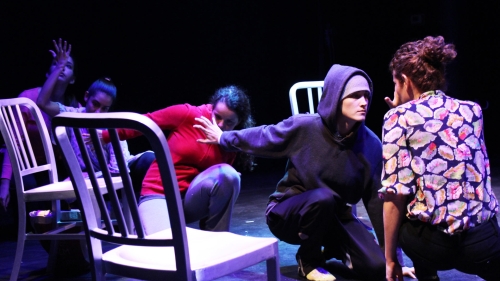

Britton Williams, PhD, LCAT, RDT-BCT is a Black woman. Drama Therapist. Artist. Activist. Storyteller. She is a multitude of hyphens, contradictions, and ands. She is an educator and student. A thinker and dreamer. Britton is deeply and urgently concerned with the possibilities that live with/in radical (re)imagining and the inextricable connectedness of healing and liberation. Her research project, The Black MAP Project: A Black People’s Epistemology of Healing, lifts the history and trajectory of Black creative healing and seeks to historicize and (re)imagine mental health care for Black people(s) through a liberatory lens.
As a licensed creative arts therapist (LCAT), Britton has a private practice based in New York. Her work additionally extends to non-clinical settings. In this capacity, she engages drama therapeutic techniques with/in organizations, companies, schools, and universities to guide and facilitate experiences that foster care, justice, and collective wellbeing.
As an educator, Britton is interested in processes that allow students and clinicians to use drama therapeutic and other creative interventions to illuminate and challenge their implicit assumptions in support of just practice.
Degrees Held:
BFA
MA
PhD
Awards:
Community Justice Collaborative Fellowship, City University of New York (2020)
SCAI Fellowship Program Social Change Agents Institute (2019-2020)
Raymond Jacobs Memorial Diversity Award, North American Drama Therapy Association (2019)
Diversity Innovation Award, New York University, Steinhardt, (2019)
Mellon Humanities Public Fellows, The Graduate Center, CUNY, (2019-2022)
University Fellowship, Social Welfare Program, The Graduate Center, CUNY, (2018)
Student Scholarship Award, Lilah Hilliard Fisher Scholarship for academic excellence, professionalism and leadership, Drama Therapy Program, NYU (2011)
Courses:
Cross-Cultural Awareness for Creative Arts Therapy and Arts Education
Internship in Drama Therapy
Research Interests
- Black Aesthetics in Mental Health Care
- Carceral logics embedded in care systems
- Black liberatory praxis
- Spatial oppression
- Bias in Clinical Practice
- Relational-Role Theory
- Critical Pedagogy in the Creative Arts Therapies
- Community Care
- Community Justice
- Trauma-Informed Drama Therapy
- Ethics in Clinical Practice
Selected Publications
Chapters
- Williams, B., & Trottier, D.G. (2019). Queering the conversation: Facilitating dialogues on LGBTQ microaggressions and systems of oppression. In B. MacWilliam, D.G. Trottier, K. Long, & B. T. Harris (Eds.), Creative arts therapies and the LGBTQ community: Theory and Practice. London: Jessica Kingsley.
- Trottier, D. G, & Williams, B. (2019). Exploring social justice and dismantling dominant narratives through creative arts peer supervision. In B. MacWilliam, D.G. Trottier, K. Long, & B. T. Harris (Eds.), Creative arts therapies and the LGBTQ community: Theory and Practice. London: Jessica Kingsley.
- Landis, H., Williams, B., Creative Arts Based Approaches to Working with Adolescent Resistance. In Haen, C., & Webb, B. (2019). In Creative Arts-Based Group Therapy with Adolescents: Theory and Practice
Peer-Reviewed Articles
- Williams, B. (2023). Poetic Awakenings: (Re)imagining Epistemic Justice and Academic Writing through a Black Aesthetic Lens. Qualitative Studies, 8(1), 58–86. https://doi.org/10.7146/qs.v8i1.136781
- Williams, B. (2021). Tracks on Repeat: An Autoethnographic Poessay. Voices: A World Forum for Music Therapy, 21(1). https://doi.org/10.15845/voices.v21i1.3227
- Williams, B., (2020) The R-RAP revisited: Current conceptualizations and applications. Drama Therapy Review 6:2, 183-201
- Williams, B. M. (2018), ‘Unapologetically black: Seven questions and poems that explore how race performs in clinical practice’, Drama Therapy Review, 4:2, pp. 223–32.
- Williams, B. M. (2017), ‘Role power: Using role theory in support of ethical practice’, Drama Therapy Review, 3: 1, pp. 131–48.
- Williams, B. M. (2016), ‘Minding our own biases: Using drama therapeutic tools to identify and challenge assumptions, biases and stereotypes’, Drama Therapy Review, 2: 1, pp. 9–23.
Commentaries
